
Petar Sokolov was a Bulgarian revolutionary, anarchist, and member of the Internal Macedonian-Adrianople Revolutionary Organization. [1]

Petar Sokolov was a Bulgarian revolutionary, anarchist, and member of the Internal Macedonian-Adrianople Revolutionary Organization. [1]
Petar Sokolov was born in 1870 in Kyustendil, then in the Ottoman Empire. He graduated from the secondary school in Kyustendil and then moved to Sofia. Since he had the talent of an artist, he moves among artists and associates with famous artists. After all, Sokolov decided to join the Macedonian-Adrianopolitan revolutionary movement. From June to October 1899 Sokolov took part in a cheta, led by Gotse Delchev. The Cheta managed to kidnap a rich Greek and later released him for a ransom. [2]
In 1899, together with Slavi Merdjanov, Pavel Shatev and Petar Mandjukov, they dug a tunnel under the central office of the Ottoman Bank in Istanbul, where they planned to set a dynamite. The Chairman of the Supreme Macedonian-Adrianople Committee, Boris Sarafov, provided the money for that operation. In September 1900, the tunnel was almost completed, but due to difficulties with the supply of dynamite, the plan was temporarily abandoned. Soon, however, an Armenian revolutionary was trying to supply to the Bulgarians in the Ottoman capital explosives, but the Turkish authorities managed to arrest him. The investigation led them to the four revolutionaries who are arrested. Still, the Ottoman authorities fail to locate the tunnels and ultimately released the detainees. Merdjanov and Sokolov were deported to Bulgaria. [3]
Merdzjanov and Sokolov went to Sofia and began to think up new ideas, one of which was to hold up the Orient Express on Turkish territory near Adrianople, and to gain possession of the mail in order to finance future actions. In pursuit of this plan, they went to the Adrianople area in July 1901, with a cheta consisting of ten men, equipped with the help of Pavel Genadiev, the Supreme Macedonian Committee's representative in Plovdiv. The cheta managed to place a large quantity of dynamite on the railway line, but something went wrong, and the train passed undamaged. After this failure, they kidnapped the son of a rich Turkish landowner, but they were soon discovered and surrounded by Turkish forces. In a battle near the village of Matochina, most of the terrorists were killed or seriously wounded. Sokolov was among the dead, and Merdzjanov was captured alive, together with a Bulgarian and two Armenians. The captives were taken to Adrianople, where, in November 1901, all four were publicly hanged. [4]

The Internal Macedonian Revolutionary Organization, was a secret revolutionary society founded in the Ottoman territories in Europe, that operated in the late 19th and early 20th centuries.
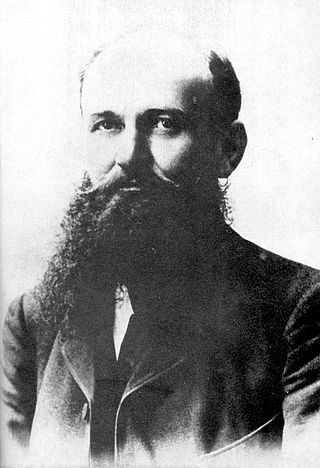
Gyorche Petrov Nikolov born Georgi Petrov Nikolov, was a Bulgarian teacher and revolutionary, one of the leaders of the Internal Macedonian Revolutionary Organization (IMRO). He was its representative in Sofia, the capital of Principality of Bulgaria. As such he was also a member of the Supreme Macedonian-Adrianople Committee (SMAC), participating in the work of its governing body. During the Balkan Wars, Petrov was a Bulgarian army volunteer, and during the First World War, he was involved in the activity of the Bulgarian occupation authorities in Serbia and Greece. Subsequently, he participated in Bulgarian politics, but was eventually killed by the rivaling IMRO right-wing faction. According to the Macedonian historiography, he was an ethnic Macedonian.
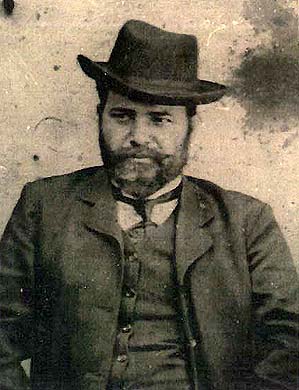
Petar Poparsov or Petar Pop Arsov was a Macedonian Bulgarian revolutionary, educator and one of the founders of the Internal Macedonian Adrianople Revolutionary Organization (IMARO). He is regarded as an ethnic Macedonian by the historiography in North Macedonia.
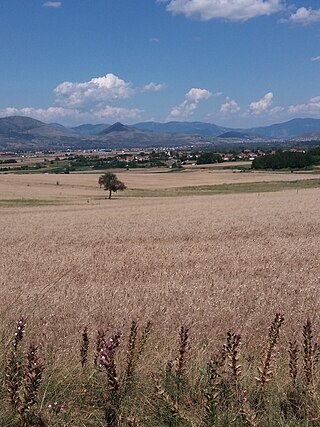
Kalochori (Greek: Καλοχώρι, before 1926: Δοβρόλιτσα - Dovrolitsa; Macedonian Slavic: Добролишта, Bulgarian: Добролища, Добролишча in the Kostur dialect, is a small rural village, part of the municipal unit of Kastoria, Kastoria regional unit, Greece. Kalochori is also located 14 kilometers away from the city of Kastoria and 14 kilometers away from the village of Nestorio. It was a part of the former municipal unit of Mesopotamia. The village has an elevation of 721 meters above sea level.
The Boatmen of Thessaloniki or the Assassins of Salonica, was a Bulgarian anarchist group, active in the Ottoman Empire in the years between 1898 and 1903. The members of the Group were predominantly from Veles and most of them − young graduates from the Bulgarian Men's High School of Thessaloniki. The group was radicalized by the Bulgarian anarchist Slavi Merdzhanov, whose initial target was the capital Constantinople, and subsequently Adrianople, but after his execution by the Ottomans in 1901, the group's attention shifted to Thessaloniki. From 28 April until 1 May 1903 the group launched a campaign of terror bombing in Thessaloniki. Their aim was to attract the attention of the Great Powers to Ottoman oppression in Macedonia and Thrace. The group's roots can be traced to 1898 in Geneva, and nearly all its founders were natives from Bulgaria. It was associated with the Internal Macedonian-Adrianople Revolutionary Organization, but had also close ties with the Supreme Macedonian-Adrianople Committee. The result of the bombings was disastrous for the Bulgarian community in Thessaloniki. According to the post-WWII Macedonian historiography, the group consisted of ethnic Macedonians.

Supreme Macedonian-Adrianople Committee (SMAC),, also known as Supreme Macedonian Committee was a Bulgarian paramilitary and political organization, active in Bulgaria as well as in Macedonia and Thrace regions of the Ottoman Empire. It was based in Bulgaria from 1895 to 1905. Macedonian Bulgarian and Thracian Bulgarian emigrants in Bulgaria were a great number. Led by Trayko Kitanchev, they formed in 1895 the “Macedonian-Adrianople Organization”, at the head of which was “Supreme Macedonian-Adrianople Revolutionary Committee”. Its official declaration was also a struggle for autonomy of Macedonia and Thrace. At the same time, being impatient for the liberty to come sooner, and strongly convinced that it would come only with the help of the Bulgarian Army. Later they directed their efforts in activities for involving the country into war with the Ottoman Empire as for example during the Supreme Macedonian Committee chetas' action in 1895, and the Gorna Dzhumaya Uprising in 1902. As a rule most of the leaders were with stronger connections with the governments. At the end their main idea was, waging struggle for a direct unification with Bulgaria.
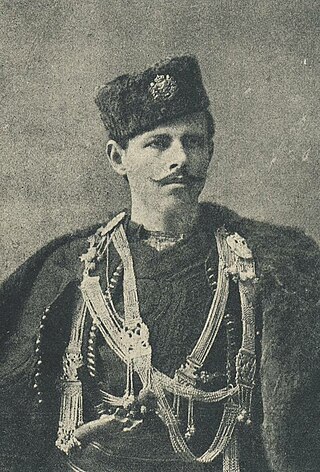
Dimche Sarvanov, also Dimko Mogilcheto or Dimche Mogilche, was a Macedonian Bulgarian revolutionary and a member of the Internal Macedonian-Adrianople Revolutionary Organization.
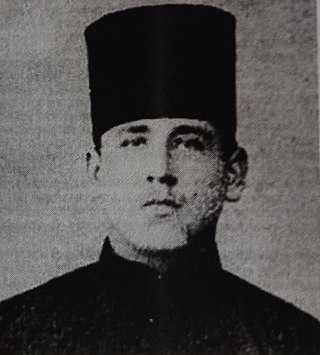
Mile Popyordanov, born Milan Popyordanov, was a Macedonian Bulgarian revolutionary and member of the Internal Macedonian-Adrianople Revolutionary Organization (IMARO). He is considered a Macedonian by the historians in North Macedonia.

Hristo Dimitrov Uzunov was a Macedonian Bulgarian teacher and revolutionary, head of the Ohrid branch of the Internal Macedonian Revolutionary Organization and its ideological leader in the Ohrid region.

Georgi Atsev, known as Goga, was a Bulgarian revolutionary, a worker of the Internal Macedonian-Adrianople Revolutionary Organization (IMARO) in the Prilep region.

Atanas Gradoborliyata was a Macedonian Bulgarian revolutionary, a worker of the Internal Macedonian-Adrianople Revolutionary Organization (IMARO).
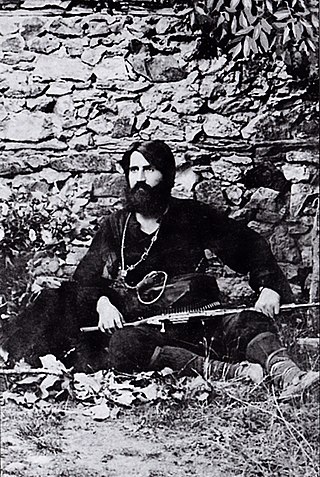
Petar Atsev was a Macedonian Bulgarian revolutionary, and a voyvoda of the Internal Macedonian-Adrianople Revolutionary Organization (IMARO) for the region of Prilep. He worked as a Bulgarian teacher.

Georgi Kostov Sugarev was a Bulgarian revolutionary, vojvoda of the Internal Macedonian-Adrianople Revolutionary Organization. In North Macedonia, Sugarev is part of the country's historical heritage as an ethnic Macedonian.

Nikola Petkov Pushkarov (1874–1934) was the first Bulgarian soil researcher and founder of the soil science in Bulgaria. He was also an activist of the Internal Macedonian-Adrianople Revolutionary Organization.
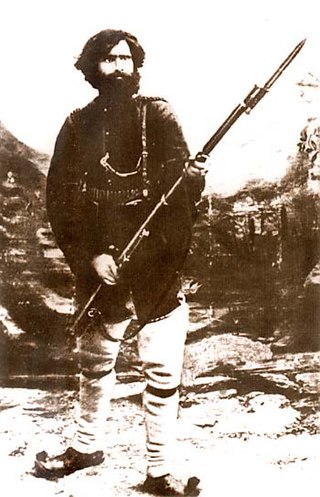
Aleksandar Turundzhev was a Bulgarian revolutionary from Ottoman Macedonia and leader of the Lerin cheta of the Internal Macedonian Adrianople Revolutionary Organization. According to the post-WWII Macedonian historiography, he was an ethnic Macedonian.

Petar (Pere) Naumov Toshev was a Bulgarian teacher and an activist of the Internal Macedonian-Adrianople Revolutionary Organization. In the historiography in North Macedonia he is considered an ethnic Macedonian revolutionary.

Svetoslav Chanev Merdzanov (1876–1901) was Bulgarian anarchist and revolutionary. He was better known as Slave or Slavi Merdzhanov. Merdzhanov was founder of the group called the Gemidzii, which organized the Thessaloniki bombings of 1903.

Petar Georgiev Mandzhukov was a Macedonian Bulgarian revolutionary and anarchist, member of the Internal Macedonian-Adrianople Revolutionary Organization and of the Supreme Macedonian-Adrianople Committee.

Due to the lack of original protocol documentation, and the fact its early organic statutes were not dated, the first statute of the clandestine Internal Macedonian Revolutionary Organization (IMRO) is uncertain and is a subject to dispute among researchers. The dispute also includes its first name and ethnic character, as well as the authenticity, dating, validity, and authorship of its supposed first statute. Certain contradictions and inconsistencies exist in the testimonies of the founding members of the Organization, which further complicates the solution of the problem. It is not yet clear whether the earliest statutory documents of the Organization have been discovered. In general, it was often called "the Bulgarian Committee" on the eve of the 20th century. Its members were designated as Comitadjis, i.e. "committee men". Based on the samples of statutes and regulations of the Organization discovered so far, it appears it was firstly officially called Bulgarian Macedonian-Adrianopolitan Revolutionary Committees (BMARC), although this conclusion is still debatable.
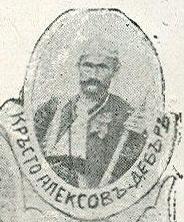
Krsto Aleksov was a Macedonian Bulgarian revolutionary of the Internal Macedonian Revolutionary Organization. He is considered an ethnic Macedonian in North Macedonia.